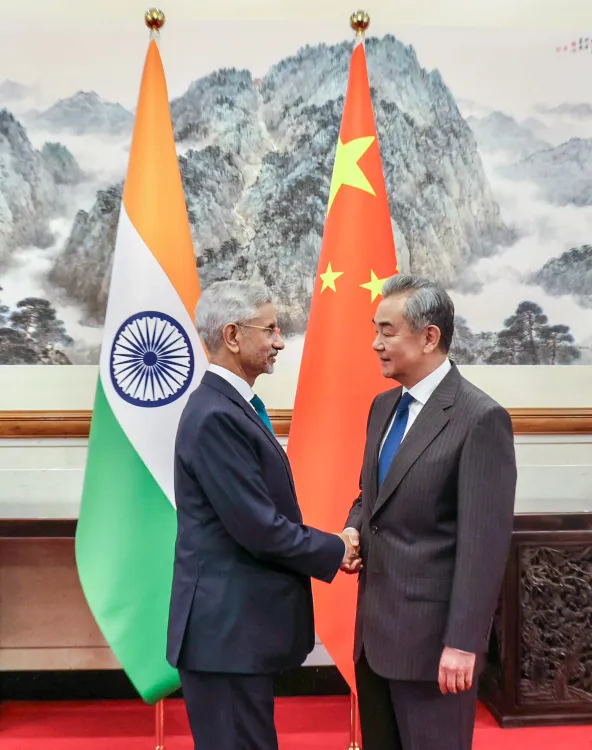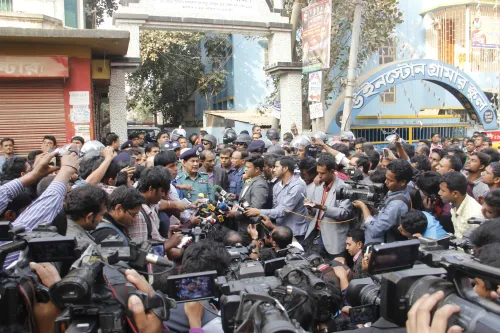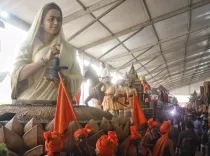Is Chinese Foreign Minister Wang Yi Visiting India on Monday?

Synopsis
Key Takeaways
- Wang Yi's visit is crucial for discussions on the boundary issue.
- The talks represent a potential thaw in India-China relations.
- PM Modi's upcoming participation in the SCO Summit is a significant diplomatic move.
- India has expressed concerns about terrorism in international forums.
- Over 20 countries will participate in the SCO Summit.
Beijing, Aug 16 (NationPress) The Foreign Affairs Minister of China, Wang Yi, is scheduled to arrive in India on August 18 (Monday) for the 24th Round of Talks concerning the boundary issue between China and India, as confirmed by Beijing on Saturday.
According to a statement from the Chinese Ministry of Foreign Affairs, "From August 18 to 20, a member of the Political Bureau of the CPC Central Committee, Minister of Foreign Affairs, and China's Special Representative on the China-India boundary issue, Wang Yi, will visit India. He will hold the 24th Round of Talks on the Boundary Question at the invitation of the Indian side."
This visit is poised to occur shortly before Prime Minister Narendra Modi departs for China to participate in the Shanghai Cooperation Organisation (SCO) Summit scheduled from August 31 to September 1.
The Chinese government also expressed its support for PM Modi's attendance at the SCO Summit.
During a briefing, the spokesperson for the Chinese Foreign Ministry, Guo Jiakun, stated, "China welcomes Prime Minister Modi to China for the SCO Tianjin Summit. We anticipate that with the collaborative efforts from all parties, the Tianjin summit will become a platform for solidarity, friendship, and fruitful outcomes. The SCO is expected to enter a new phase of high-quality development characterized by enhanced solidarity, coordination, dynamism, and productivity."
The Chinese Foreign Ministry indicated that leaders from over 20 countries, including all member states of the SCO and heads of 10 international organizations, are expected to participate in events related to the summit, which Jiakun referred to as the "largest summit in scale since the establishment of the SCO."
This will mark PM Modi's first visit to China since the Galwan clash in 2020, an incident that significantly impacted bilateral relations. The recent breakthrough in discussions, the first since the confrontation in Galwan Valley at the Line of Actual Control (LAC) in June 2020, was achieved after both nations reached an agreement for patrolling along the nearly 3500-km LAC, effectively ending the four-year-long border standoff.
In July, External Affairs Minister S. Jaishankar visited China for the Meeting of the Council of Foreign Ministers in Tianjin. There, he engaged in discussions with his Chinese counterpart and met with Chinese President Xi Jinping, alongside other SCO Foreign Ministers.
Earlier in June, Defence Minister Rajnath Singh traveled to China for the SCO Defence Ministers Meeting. India opted not to endorse the joint declaration during that meeting, citing the omission of terrorism-related concerns as a significant issue.
India insisted that its concerns regarding terrorism be included in the document, a request not accommodated by a specific country, resulting in the statement's failure to be adopted.
During his visit, Singh engaged with his Chinese counterpart, Admiral Don Jun, and the two leaders had a "constructive and forward-looking exchange of views" on matters related to bilateral relations.
In June, National Security Advisor (NSA) Ajit Doval also visited China for the 20th Meeting of the SCO Security Council Secretaries.
During his contribution at the meeting, he emphasized the necessity of abandoning double standards in combating terrorism and taking decisive actions against UN-designated terrorists and entities such as LeT, JeM, and their associated networks.










